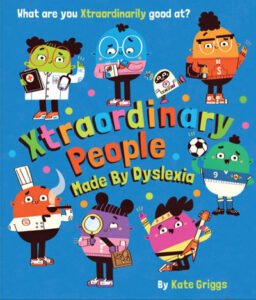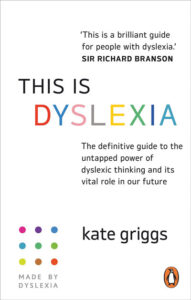
by Kate Griggs
founder and CEO of Made By Dyslexia
One in five people are dyslexic. It’s the most common neurodiversity and learning difference, and can be identified as early as preschool, though research suggests that as many as 80% leave school without knowing they’re dyslexic.
Dyslexic brains literally think differently to others, and that’s a good thing! After all, some of the world’s greatest changemakers have been Dyslexic Thinkers, from Thomas Edison inventing the light bulb to Steve Jobs creating the iPhone. Seeing things differently has helped dyslexics to invent things we can’t live without, imagine what others couldn’t see and solve problems that others weren’t able to crack.
Dyslexic Thinkers have incredible strengths in creativity, problem-solving and communication skills. Sadly, traditional benchmarking in schools means exams can’t always measure the valuable Dyslexic Thinking skills that dyslexic children have.
When I was nine years old, my life was transformed when a teacher saw past my test scores and recognised my Dyslexic Thinking skills. These skills are the very things that help me succeed in my role today, and I use them every day to do something that I absolutely love.
I have seen the same ‘success formula’ in thousands of dyslexic people, young and old.
It’s the formula I encouraged with my own children, which has led them into fulfilling careers too.
Here are five things every parent can do to support your child with dyslexia:
1. Spot their strengths
If you’re a parent of a dyslexic child, the most transformative thing you can do is to help them spot their dyslexic strengths, instead of being defined by their challenges. Focusing on things they are naturally good at, instead of what they find tricky, leads Dyslexic Thinkers into jobs they love and lives that are fulfilling.
Dyslexics excel in the subjects they love because they tap into their Dyslexic Thinking skills, such as creativity, exploring and questioning (often performing much better than their peers), but they may struggle to grasp other skills their peers find easy (organisation, spelling, punctuation and grammar).
Often in dyslexic children there is a mismatch in what they seem capable of and the written work they produce. On paper they might have a hard time articulating and organising their ideas but when you ask them to verbalise what they’re thinking they blow you away by the richness of their vocabulary and the complexity of their ideas.
2. Build their self-esteem
Spotting Dyslexic Thinking and focusing on someone’s strengths is key to building self-esteem. Because otherwise, they lose confidence in themselves and their ability to learn. There is a real danger that when children find things challenging that their friends find easy, they lose heart and mistakenly believe they are less able or less intelligent than their peers (when neither is the case). Dyslexic Thinking is a valuable sought after skill, so every dyslexic should be encouraged to be proud of how they think.
3. Support them with positive praise
Research suggests that we are most motivated to improve when we hear negative and positive comments in a ratio of 1:5. That’s five pieces of praise for every one negative comment. It’s true in teaching and it’s true in relationships and workplaces. Positive praise is vital for dyslexic children. And even if certain things are challenging, each small win should be celebrated. It’s vital to acknowledge and highlight Dyslexic Thinking skills in every dyslexic child, so these children can experience the success they deserve.
4. Empower them
Not only is focusing on Dyslexic Thinking skills crucial to building positive self-esteem but it will help us find the careers that we’ll be successful at and feel fulfilled in. For instance, young vegan chef, CBBC presenter and YouTube star Omari McQueen found that school and his extraordinary dyslexic mind didn’t quite fit. But then he discovered his passion for cooking. Now, he runs his own vegan dip company, presents a CBBC TV cookery show, hosts his own YouTube channel and has written a cookbook. Proving, of course, that when dyslexic children are empowered to find and focus on their Dyslexic Thinking skills, they are truly unstoppable.
5. Trust your gut
You know your child better than anyone, so trust your gut when asking for help. Most teachers aren’t trained, and many schools don’t like to label. Be persistent. Identification of dyslexia, even if it’s via a screener, not a formal assessment, is life changing for dyslexic children as it gives a reason for their struggles and strengths. The label is a good thing. Dyslexia is a superpower! The most important thing is to help them find what they’re good at – and do lots of it. By focusing on their dyslexic strengths, they can and will go far.
Kate Griggs is a Dyslexic Thinking expert, founder and CEO of the global charity Made By Dyslexia, host of the Lessons in Dyslexic Thinking podcast and the author of Xtraordinary People (a book for young 
 Dyslexic Thinkers) and This is Dyslexia (a book for adult Dyslexic Thinkers) – a new and revised edition was published in October 2024.
Dyslexic Thinkers) and This is Dyslexia (a book for adult Dyslexic Thinkers) – a new and revised edition was published in October 2024.











